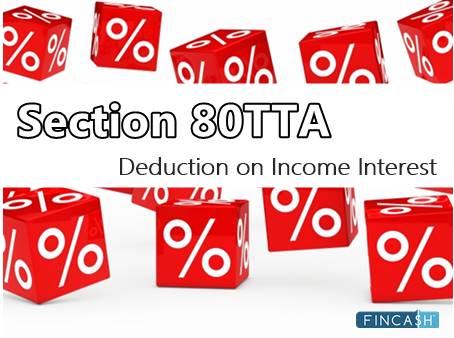
Table of Contents
All About Section 80TTA
To help individuals bring down their income tax liability, the Income tax act in India offers a variety of deductions that can be claimed by taxpayers. One of the primary reasons behind these deductions is to ensure convenience for taxpayers and encourage more filing.
These deductions could be in the form of profit-linked, income-based, payment based or investment-based. One such Deduction that turns out to be useful for taxpayers is Section 80TTA. Let’s get to understand more about its salient features and aspects.

What is Section 80TTA?
In the income tax act, Section 80TTA is termed as Deduction in respect of interest on deposits in a Savings Account. Deduction under this section can be claimed against income that comes in the form of interest from a savings account. Thus, it is considered as an income-based deduction.
Section 80TTA provides a deduction of Rs. 10,000 on income. Both HUF and individuals can claim this deduction as per the Income Tax Act. In terms of deduction on interest, there is no differentiation between senior citizens and individuals who are below the age of 60.
Also, keep in mind that you cannot claim a deduction if you are receiving interest from fixed deposits or recurring deposits as it is only applicable on a savings account. Moreover, if the fixed deposit is in the name of a partnership firm, the partner of a firm, or association of persons or body of individuals, it will not be eligible for any deduction, let alone section 80TTA.
Rules and Regulations for Section 80TTA of the Income Tax Act
To begin with, to claim 80TTA deduction, the savings account from where the interest is being earned should be held in any of the Institutions mentioned below:
- Bank
- Co-operative society
- Post Office
Furthermore, the amount that has to be claimed as a deduction should be:
- Interest Income, or
- Rs. 10,000/-
Let's take an example - suppose you are earning an interest of Rs. 12000 from your savings account. In such a scenario, you will be eligible for a deduction of Rs. 10,000 against the interest earned. Thus, the Taxable Income will be Rs. 2000.
Talk to our investment specialist
The Features of Section 80TTA
An individual can have multiple savings accounts with different banks; however the total interest income from all of these accounts should be under Rs. 10,000 to get an exemption
If the total amount exceeds Rs. 10,000, tax exemption can only be claimed for the set limit, anything additional will be subjected to income tax
No individual or HUF will have to pay the tax deducted at source (TDS)
Exceptions under Section 80TTA
Considering that deduction under this section is not allowed for interest on fixed deposits and recurring deposits, it will be taxable according to the normal slab rates of an individual taxpayer. On top of that, TDS provisions will also be applicable if the interest earned on an FD or RD is more than Rs. 10,000.
Conclusion
At last, section 80TTA provides relief to investors since they don't get to track small amounts of interest that they are getting from the savings account since they would not have to include the same for computing the total taxable income.
A tax deduction is definitely a breather for them as now they can avoid penalties for the nonpayment of Taxes on the interest rate. On the other hand, people who have lower to middle income will be benefited with Rs. 10,000 limit as well. That is surely a plus point for them.
All efforts have been made to ensure the information provided here is accurate. However, no guarantees are made regarding correctness of data. Please verify with scheme information document before making any investment.




